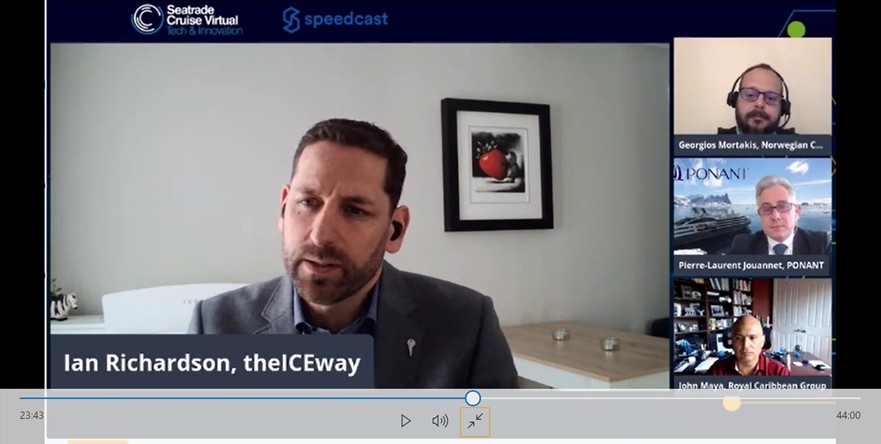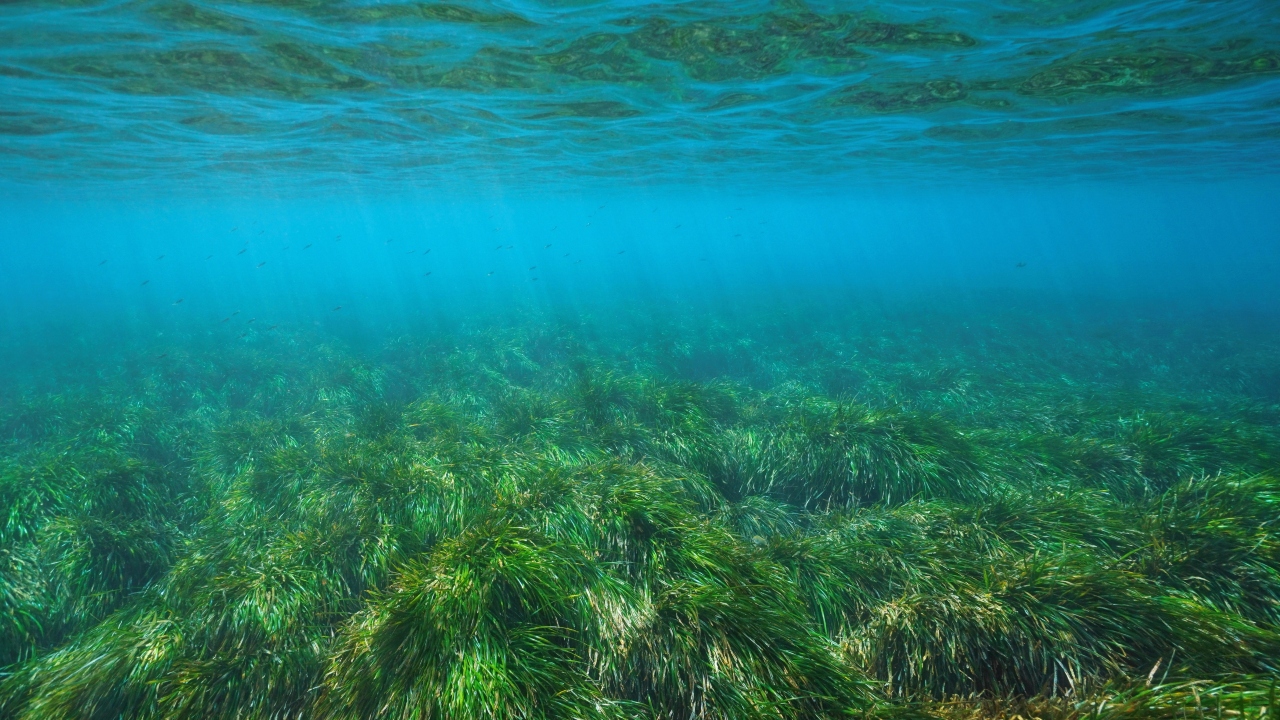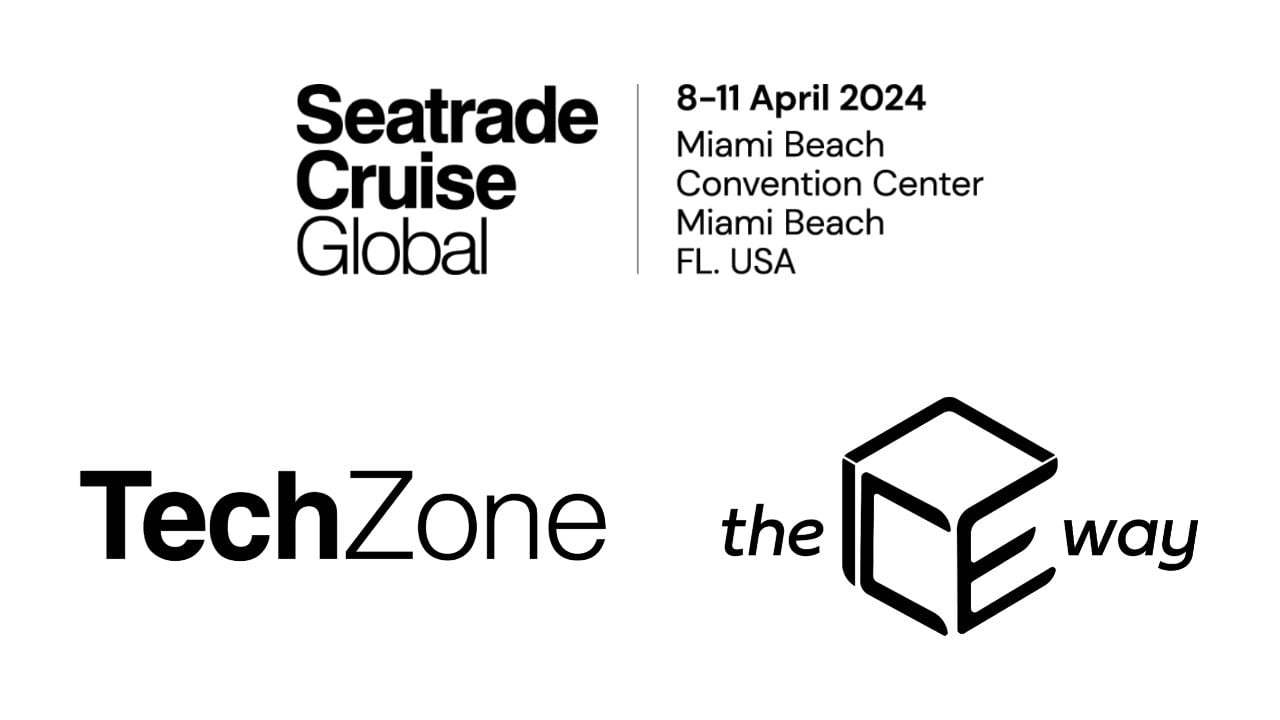Today we focus upon another session from the recent Seatrade Cruise Virtual: Tech & Innovation event. Georgios Mortakis from NCLH, Pierre-Laurent Jouannet from Ponant and the Royal Caribbean’s John Maya all joined Ian Richardson to discuss their investment plans for the upcoming 12-24 months.
Ian Richardson, CEO & Co-founder of theICEway / Seatrade Cruise Technology Ambassador (IR): “How [has] the last year… impacted your daily work… and what you've been focusing on in terms of investment?”
Georgios Mortakis, VP Enterprise Tech Ops & CISO, IT Security & Compliance, NCLH (GM): “From the shore side perspective, you had initiatives [such] as migrating everybody to work from home… making sure that nothing in IT stops… furthermore, from [a] cyber security [perspective]… incident response monitoring and… enhancement [continued].
“[As well as] those things… ‘return to sailing’ became the primary objective. [This] required a lot of investment from an IT perspective, [on] alignment technologies and integration.”
Pierre-Laurent Jouannet, Deputy Chief Information Officer Infrastructure & Production, Ponant (PLJ): “It was really an opportunity… to upgrade all our facilities… a chance to process, to update all versions of the software on board and change hardware.
“It was a really busy time for the team, the many dry docks and [upgrades to] the communication system. And of course, as Georgios mentioned, we took care of cyber security.”
John Maya, Vice President, Royal Caribbean Group (JM): “2020 was truly unprecedented for all of us and there was definitely not a playbook that we had a chance to follow. We built it on as we went along, but it definitely drove a lot of creativity. Every dollar was scrutinised. We were… in survival mode and making sure that we were very clear in how we did things, but we still had to run the business.
“So we made the necessary investments, but… a lot smarter. We figured out when good enough was actually good enough. And more importantly, [was to allow] all our employees… to operate from their respective homes.”
IR: “The results [of our poll] are in and this is what the audience think…”
STC Virtual: Tech & Innovation Poll
How will the pandemic situation affect Fleet IT infrastructure overall investment in the next 1 to 2 years?
A: Decrease by more than 75% -> 0% of the votes
B: Decrease by around 50% -> 0%
C: Decrease by around 25% -> 13%
D: Will stay roughly the same -> 12%
E: Will increase -> 75%
IR: “… 75% say that it's going to increase. That's very positive in terms of the audience sentiment. Would you agree that there's still going to be… an increase in investments?
JM: “I think it's going to, yes, but I think it's going to be very, very selective. We're not going to have the same spending patterns that we had in the past. At the end of the day, we don't just make the investment infrastructure by itself, there has to be an underlying benefit down to the guest, to the crew, to their wellbeing, their safety and that's where we're going to make those bets. The good news is that we have made significant investments prior to COVID, which helped us bridge this gap.”
IR: “It's clear that the over the next couple of years, the fleet infrastructure budgets will be heavily scrutinised as they have been this year. How do you go about setting critical investment criteria for determining what to spend or what to spend the money on?”
PLJ: “…For Ponant, it has not been business as usual of course, but because we were in layup, we had to follow our plan. [A] new vessel, ‘Le Jacques Cartier’, [was] delivered last July… [plus] last November we switched our CRM from Oracle to Salesforce. [As of] March 2021, ‘Le Paul Gauguin’ – a newly built vessel – had been in dry dock [in Singapore at a cost of] 15 million Euros… So we have been really busy and we are keeping busy… coming in July 2021 [is] ‘Le Commandant Charcot’ polar exploration vessel. So we have a busy agenda, we shall keep on growing... [and] investment will follow…”
GM: “… I agree with both Pierre-Laurent and John… [and] to supplement their comments… our mission is insulating IT to support the business. So the criticality, the vending process and the priorities that come in is satisfying the business needs… and ensuring that there is a proper guest experience… also [to] meet the requirements… under the CDC and health mandates.
“At the end of the day… we aligned the IT infrastructure and also cyber security requirements into the business… [as it was] best for the company.”
JM: “… As a corporation we’re fully aligned… that we cannot stop any type of investment on cyber security. During this time that our ships were laid up… we took advantage of that for everybody to start patching… all their equipment… [and] applications, [to] test things out.
“… From a cyber perspective, we're going to keep on opening up that tap significantly, just to make sure that we stay protected.”
IR: “I was going to talk about cyber security… because there are certain requirements by the IMO that are quite recent. Georgios… [as] the resident CISO on the panel… can [you] talk a little bit more about these requirements and what cruise lines need to do in terms of investment?”
GM: “… The brand new requirements… took effect on January 1st, 2021. It should be nothing new to cyber security professionals in the respective teams.
“We partnered with maritime operations… [because] cyber security [teams] know about IT [whilst] maritime operations know about OT [so] there is a happy medium.
“In order to… [comply] you [need] effective controls that truly support a company, not only from a proactive perspective, but in case something happens, you have [the] necessary… controls to minimise the impact.”
IR: “… In terms of IOT devices and investment into IOT, which… areas are the cruise lines focusing on? There have been a lot of IOT devices around biosecurity… probes and sensors… is that something that's going to be present for the future in terms of the longevity of these investments on the ships?”
GM: “… IOT… is definitely related to this discussion. There is a tremendous amount of investment and there's a tremendous amount of dependency on this technology so from an operational perspective sometimes to make life easier, and I'll say sometimes, because every time we introduce new technology, there [are] also the idiosyncrasies, complexities, anything associated to integrate those systems.
“It's not plug and play, contrary to what most vendors will tell you. Then from a cyber security perspective it's just a… system or technology stack to basically monitor or patch and make sure you have… mitigating controls for any issue.”
IR: “… Staying on the topic of IOT or devices in general on ships, I want to talk about video analytics. I know that Royal are using a lot of video analytics on board… [and] obviously in the last year, it's really exploded.”
JM: “Very true. And so the reason primarily for video analytics at this stage of the game is around contact tracing and we actually use it as a complement to our IOT devices, what we call our ‘Tracelet’… the wearable device that every guest and crew member carries around while they're on the ship. We're definitely leveraging a lot of those features so that if we do run into any sickness situations, we're able to identify that guest, but more importantly, the interaction that guest has had with other guests or crew members on board, so we could contain the situation. I think it's all about containing it as best as best as we can, but also as quickly as you can.
“I'm not sure what the future holds for [tracelet], but I would say from video analytics it is very broad, the features that are provided [for] you. So for example, you could look at where crowds are gathering, looking for high density areas on a ship, look at the lines that are being formed either into our restaurant or into our shows. And then based on that, we're able to reallocate crew members to help guests through that and maximise [their] experience.”
PLJ: “… For Ponant, we are looking forward to those capabilities, but our ships are… smaller.
“We have… more open ways of seeing things but… we need to connect them [via IOT] and we need to take care of them and each time we need to connect them to some providers and make sure that all those things remain compliant with those new directives.”
IR: “… I'd like to talk about… the overall operational cost of a vessel… we mentioned scrutiny and cost previously, and IOT… [with] things like predictive maintenance [can] reduce the operational cost of a vessel. Is this an area that we will see a lot more investment into over the next one to two years? Into probes and various data analytics on sensors?”
PLJ: “We are looking [at] that already in detail [with] our fuel consumption. For instance, we are always optimising our routes… [using] sensors… and a lot of data to… find the best way to minimise our fuel consumption.”
IR: “And John… is there something new that you're doing or that you're looking into in terms of reducing [operational] cost through IOT and monitoring data?”
JM: “Absolutely, there's definitely a financial benefit leveraging IOT.
“We're starting to take action now when we… see that the engine is going to have a failure [for example]. Using predictive analytics… allows us to start taking… actions proactively.”
IR: “… A couple of years ago everybody was talking about LEO, low-earth orbit satellites, and having the extra bandwidth that they provide, is that an area that is still as important to cruise lines today in terms of the investment into LEO capable antennas?
“What sort of areas are you investing into in this?”
GM: “… We all have [a] dependency as far as how much bandwidth and… it increases with cloud architecture, virtualisation… making sure that… there is interconnectivity.
“The business model will… [show that passenger internet usage on board] five years ago versus now has changed tremendously.
“[There] is a huge dependency right now… [but] there is no easy answer to [simply] increasing the bandwidth. There [are] physical considerations as far as how many dishes to have… [plus the] cost associated with the providers. And there's also the different technological integrations… But [from] my perspective, and on every meeting I go to, the bandwidth consideration is one of the first things that my team [asks about] when it comes down to new initiatives.
PLJ: “… Bandwidth is always a scarce resource… unfortunately, our vessels operate close to the North pole and South pole. And… our new vessel… is a polar exploration vessel… [and] will go much further. So we… have to find some means of connectivity.
“… We are… now exploring… [a] new set of low orbit satellites in order to have a synchronous connection because… we need to find a way to provide our customers with… news feeds and so forth.”
JM: “… We used to be more concerned about whether it was LEO, GEO, MEO. And at this point, when we talk to our partners that speak CAS and SES, it's more about maintaining connectivity, wherever the vessels are going to be.
“… We foresee that… having wi-fi [used to be a luxury]… [but is now] something that [guests] need, that they will demand so they can maintain connectivity and always be informed of what's going on around the world.”
IR: “… This question is more related to… larger groups which have… multiple brands wanting to talk about the investment strategy across the brands and across the different sub brands within that group.
“What sorts of investments are centrally managed versus what are individually managed by the different brands?”
JM: “We have various brands… the Royal Caribbean group, when it deals with primarily infrastructure in general, it [is done in a centralised manner]… because we look at the commonality across the board. What we will see perhaps more specific is to the vessel, the vessel is something more specialised, or it's actually targeting a specific type of guest.
“We'll let the brand figure that out and determine what is the best thing for their guests. But we try to centralise as much as we can so we can get better leverage and better economies of scale.”
GM: “Centralised and also… standardised.
“… Each of the brands [has] a different… business leadership but they all work together and… [have] a cohesive set of discovery requirements. [They] adjust to all the separate needs at the end of the day… ensuring that in essence, we have a common platform that we can further build modules upon.”
IR: “I wanted to talk a little bit about outsourcing or outsourcing versus insourcing, because… various other industries… have [decided] to outsource certain technology services. Should the cruise industry follow suit, or is it too specialised?
“Which services or products could be outsourced?”
JM: “You could either in-source everything or outsource everything. And obviously extremes are never very good for anybody.
“… Our usual rule of thumb is, let's understand what is our core competence, what is it that we're looking to deliver? We're not… an IT company, we're a cruise line.
“… Let's leave a lot of the IT work to the experts that know how to do it best, [who] can do it more cost-effectively. But when it has to do with guest experiences, that's something that we'll keep internally to us.”
PLJ: “… Customer experience... the restaurant and food and beverage services… it's [the Ponant] brand that does that.
“… There is no way for us to outsource this. I mean, we train our… crew members and they are dedicated to our customers.
“… We are really keen [to provide] five-star services to our customers.”
IR: “… There [are] some really good questions coming in from the audience… Is there anything being done to improve the connectivity for crew? There's a lot of talk about guest experience understandably, but when the cruises resume, crew may not be permitted to go ashore and connectivity with family at home is critical.”
GM: “… Connectivity is much more important than it used to be.
“… [The crew] just spend time on the ship. So connectivity, communication, keeping up with your friends and family [is] important. Obviously… you have IT, you have operations, you have navigation systems communicating for metrics. You have passengers and you have the crew and… we [are] trying to slice the pie as best as we can. But there is… definitely… a [realisation] that we need to improve the communication leverage… to accommodate the crew much more than we used in the past.”
JM: “… [For] Royal Caribbean, it is clear that the crew needs to have connectivity back to their respective families.
“… [In terms of connectivity], you just may not even have it because you've gone so far North or South… It [is] constantly an art of balancing… making sure that… every crew member… [can] video their family.
“… When there's more bandwidth made available, I think that will give us more flexibility.”
IR: “… There's a couple of questions here about the onboard revenue model or… how that is factored in.
“… How do you think the onboard revenue model might change with the passengers [needing] to stay reliably connected… post pandemic?
“… If you factor that against the increase of the requirement for crew, do you think that the revenue model for internet bandwidth may need to change… [due to] more demand?”
PLJ: “… For us, it's difficult to change because everything is already included. We provide… what we can provide, and that's not always easy.
“… Sometimes for instance, some customers… [ask us if they can use] their own… communication system, which will interfere with the onboard one.
“… Sometimes that is not easy to answer… there was no way to have a fibre attached to the vessel when it's cruising.”
JM: “… As the cost per megabits starts dropping, then it will have a little bit more flexibility and… [we can] pass that on to… our guests, as well as crew members.”
GM: “… There has to be a true partnership with us on this side of the business and… the satellite providers.
“… From a technological perspective… everybody from the shore [is] used to having bandwidth… on demand we can stream multiple services.
“… Five years ago, things were different but… with 5G being introduced, [expectation] is going to become even [higher]… you will expect to have speed on demand. So there has to be a [true] collaboration and partnership between the service providers and… us.”
Contact us for the full transcript of ‘Navigating the Future of Fleet IT Infrastructure Investments’















Leave a Comment